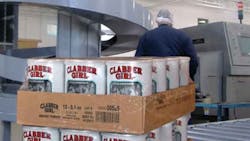Lean-Manufacturing Recipe Reinvigorates Century-Old Clabber Girl
You don't pass the century mark without having done many things right, and Clabber Girl Corp. is well past that landmark age. Indeed, the Terre Haute, Ind.-based company, best known for its Clabber Girl brand, has been making baking powder for the retail market since 1870.
Like any manufacturer of any age, however, Clabber Girl faces a wealth of challenges in its bid to remain competitive for the next 100 years -- including reining in costs, improving productivity, and keeping current with new processes and technologies. Plus one of its manufacturing structures is more than a century old, bringing with it inefficiencies inherent in a six-story vertical structure built for another time.
"All of these are forces that led us to say, 'We can't continue to do [business] the same way we've been doing it,'" explains Gary Morris, president and COO of Clabber Girl, Terre Haute, Ind.
To that end, the company has embraced lean manufacturing as a means to reach continuing milestones. Clabber Girl is slightly more than halfway through a 24-month lean training program delivered by Purdue University's Technical Assistance Program. Focused first on manufacturing and distribution (both supervisors and hourly workers), the training ultimately will roll out across the remainder of Clabber Girl.
Morris is receiving the training, too. "If I can't be behind it, if they [the employees] can't see that I'm passionate about it, then they're not going to be," he says.
While Clabber Girl's manufacturing processes call for a significant amount of automation, it is a batch producer of a variety of products rather than a continuous-flow operation. In addition to the Clabber Girl brand, the company produces private-label products and regional baking powder brands, and its foodservice line includes Royal dessert products such as gelatins and cheesecake mixes.
Value-stream and process mapping exercises have revealed multiple opportunities for cycle-time reductions in this environment, the company president says. Formula changeovers and packaging and labeling are prime examples of such opportunities, as is material movement.
"There are opportunities for improvement all along the way," Morris says.
For example, he says the company has realized a huge reduction in the material wasted during the filling process on its production lines, thanks to the problem-solving techniques shared by the Purdue instructors.
Inviting a Fresh Perspective
Clabber Girl's lean training also ties in nicely with the fresh perspective the company receives via its Clabberation project, a partnership with Indiana State University that brings operations-management students into the company to engage in practical learning situations.
"One of the interesting things I like about having them come in is they dont know what they dont know, and they ask questions we take for granted," Morris says. "It causes you to sit back and say, Thats a darn good question, why didnt we ask that."
He adds, "I think it has energized some of the employees because the kids are enthusiastic and engaged, and employees feel like they have the ability to share what they know."
They also are working on projects together. For example, both employees and students teamed to evaluate one of the packaging processes on a gelatin line (it requires hand packing) -- performing time studies, considering improvements and presenting their results to operations management.
Morris says the company is reaping benefits both from its Clabberation project and the lean training. What's perhaps most beneficial from the lean training, he says, is that operators have gained an appreciation about how their works impacts the facility as a whole.
"The person at the point of the operation understands what the problems are in the whole facility, how it connects to them, what it means at their spot to be unproductive and what it means after it leaves their spot to be unproductive," Morris says. "They are getting connected."
And the lean efforts don't conclude when the training is complete. Morris says lean manufacturing will help assure that Clabber Girl not only stays in business, but also thrives.
"This company's been around for 162 years, and our plan is to make sure it is financially viable and successful for the next 100 [years]. It's entirely possible, but you need to use all of the available tools, lean manufacturing being one of them."
See Also: IndustryWeek's Lean and Six Sigma Archives
About the Author
Jill Jusko
Bio: Jill Jusko is executive editor for IndustryWeek. She has been writing about manufacturing operations leadership for more than 20 years. Her coverage spotlights companies that are in pursuit of world-class results in quality, productivity, cost and other benchmarks by implementing the latest continuous improvement and lean/Six-Sigma strategies. Jill also coordinates IndustryWeek’s Best Plants Awards Program, which annually salutes the leading manufacturing facilities in North America.
Have a story idea? Send it to [email protected].

